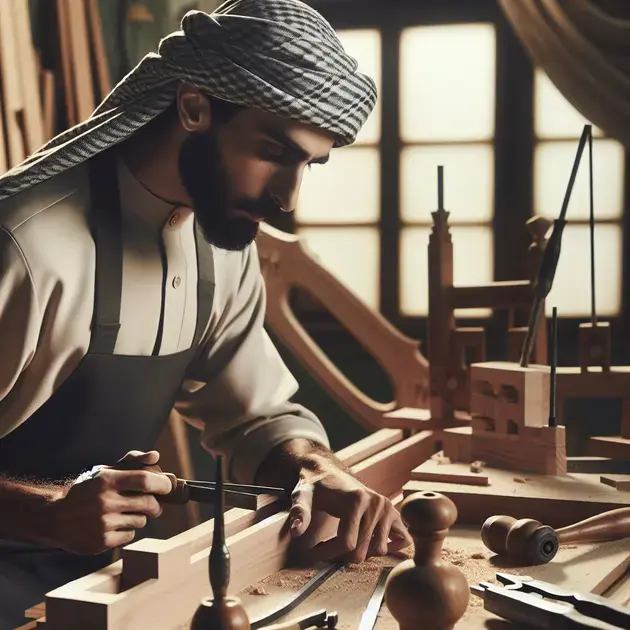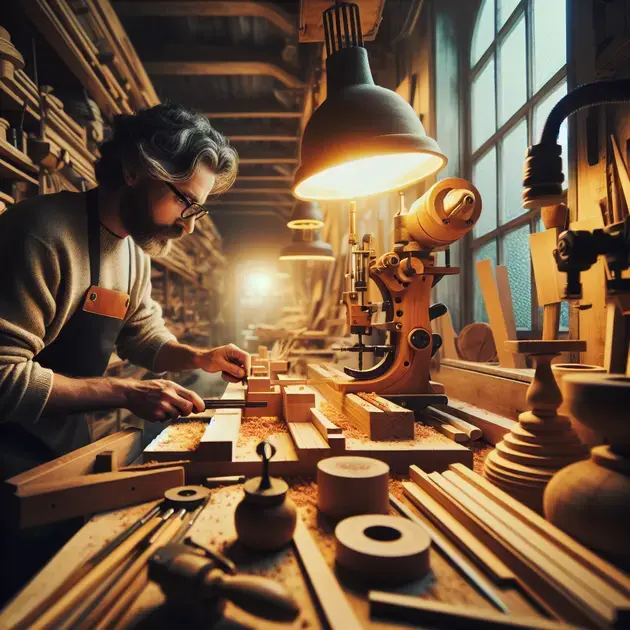Are you ready to take your woodworking projects to the next level? In this post, we will explore a variety of tips and tricks to help you in crafting beautiful creations that you can be proud of. Woodworking is not only a rewarding hobby but also a practical skill that can be utilized in creating custom pieces for your home.
With the right techniques and tools, you can enhance the beauty and quality of your woodworking projects. From selecting the perfect type of wood to mastering different joinery methods, this guide will provide you with valuable insights to elevate your craft. Stay tuned for expert advice and inspiration on how to improve your woodworking skills and create stunning pieces that showcase your creativity and passion for woodworking.

Elevating Your Woodworking Skills
Improving your woodworking skills takes time, dedication, and practice. One effective way to elevate your woodworking skills is by taking online courses on platforms like Skillshare or Udemy. These platforms offer a wide range of woodworking classes taught by experienced professionals. By enrolling in these courses, you can learn new techniques, tips, and tricks to enhance your woodworking abilities.
Another way to elevate your woodworking skills is by joining woodworking communities or forums such as WoodNet or Lumberjocks. These platforms provide a space for woodworkers to connect, share knowledge, and seek advice. Engaging with other woodworkers can expose you to different perspectives, ideas, and methods, ultimately helping you improve your craft.
Additionally, investing in high-quality tools and equipment can significantly impact your woodworking skills. Websites like Woodcraft or Rockler offer a wide selection of woodworking tools and accessories to suit every need. Having the right tools can make a world of difference in the outcome of your projects and can help you work more efficiently.
Practicing regularly and challenging yourself with new projects is also crucial in elevating your woodworking skills. Start by creating small, manageable projects and gradually work your way up to more complex pieces. Experimenting with different techniques and materials can help you broaden your skill set and become a more versatile woodworker.
Lastly, don’t be afraid to make mistakes and learn from them. Failure is a part of the learning process, and each mistake presents an opportunity for growth and improvement. Embrace challenges, stay curious, and stay committed to honing your woodworking skills.
Mastering Wood Selection and Joinery Methods
Choosing the right type of wood and mastering joinery methods are essential aspects of woodworking. To master wood selection, educate yourself on different wood types, grain patterns, and characteristics. Websites like The Wood Database provide detailed information on various types of wood, helping you make informed decisions.
When it comes to joinery methods, understanding the fundamentals of joinery techniques such as dovetail joints, mortise and tenon joints, and finger joints is crucial. Platforms like Wood Magazine offer step-by-step tutorials on different joinery methods, guiding you through the process of creating strong and seamless connections in your woodworking projects.
Experimenting with different wood species and joinery techniques is key to mastering these skills. Start by practicing basic joinery cuts and gradually move on to more complex joints as you gain confidence. Additionally, consider using online resources such as Fine Woodworking or Popular Woodworking for detailed guides and video tutorials on wood selection and joinery.
Investing in quality woodworking books and reference guides can also deepen your knowledge of wood selection and joinery methods. Books like “Understanding Wood” by Bruce Hoadley and “The Complete Illustrated Guide to Joinery” by Gary Rogowski are valuable resources that can help you enhance your understanding and skills in these areas.
Remember, mastering wood selection and joinery methods is a continuous learning process. Dedicate time to practice, seek advice from experienced woodworkers, and don’t be afraid to experiment with different woods and joinery techniques to refine your skills.
Unlocking Expert Tips for Stunning Creations
Creating stunning woodworking projects requires a combination of creativity, skill, and attention to detail. To unlock expert tips for stunning creations, consider studying the works of renowned woodworkers and designers. Websites like Fine Woodworking Showcase feature galleries of exceptional woodworking pieces, providing inspiration and insights into design techniques.
Another tip for achieving stunning creations is to focus on precision and accuracy in your woodworking. Use measuring tools such as calipers and squares to ensure your cuts and joinery are precise. Platforms like Woodworker’s Journal offer articles and tutorials on achieving accuracy in woodworking, helping you elevate the quality of your projects.
Experimenting with different finishes and surface treatments can also enhance the beauty of your woodworking projects. Websites like Wood Magazine or The Spruce Crafts offer tutorials on various wood finishes and techniques, helping you achieve different looks and textures in your creations.
Collaborating with other craftsmen and seeking feedback on your work can provide valuable insights for improving your woodworking skills. Join local woodworking groups or attend woodworking workshops to connect with fellow enthusiasts and professionals. Constructive criticism and shared experiences can help you refine your techniques and develop your unique style.
Lastly, never underestimate the power of practice and perseverance in creating stunning woodworking projects. Rome wasn’t built in a day, and mastery in woodworking takes time and dedication. Keep pushing your creative boundaries, embrace challenges, and keep striving for excellence in every project you undertake.

Enhancing Your Woodworking Techniques
Woodworking is a craft that requires both skill and precision. To enhance your woodworking techniques, it is important to focus on honing your skills and learning new methods. One way to do this is by taking woodworking classes or workshops where you can learn from experienced woodworkers. Additionally, practicing regularly and challenging yourself with new projects can help improve your skills.
Another way to enhance your woodworking techniques is by investing in high-quality tools and equipment. Having the right tools for the job can make a significant difference in the quality of your work. It is also important to keep your tools well-maintained and sharp to ensure they perform at their best.
Experimenting with different woodworking techniques, such as joinery and finishing methods, can also help you expand your skills. By trying new techniques and pushing yourself out of your comfort zone, you can grow as a woodworker and create unique and beautiful pieces.
Collaborating with other woodworkers and seeking feedback on your work is another valuable way to enhance your woodworking techniques. By sharing ideas and learning from others in the woodworking community, you can gain new perspectives and improve your craft.
In conclusion, enhancing your woodworking techniques requires dedication, practice, and a willingness to learn and grow. By focusing on honing your skills, investing in quality tools, experimenting with new techniques, and seeking feedback, you can elevate your woodworking to new levels.
Exploring Advanced Woodworking Tools
Advanced woodworking tools can help take your craft to the next level by allowing you to tackle more complex projects and achieve greater precision. One essential advanced woodworking tool is a precision miter saw, which enables you to make accurate angled cuts with ease. A router table is another valuable tool for woodworking, as it allows you to create intricate designs and edges.
Investing in a quality table saw with advanced features such as a riving knife and adjustable fence can also enhance your woodworking capabilities. A thickness planer is another advanced tool that can help you achieve precise thickness and smooth surfaces on your wood pieces.
Exploring the world of advanced woodworking tools can be overwhelming, but by starting with a few key tools and gradually adding to your collection, you can build a versatile workshop that meets your needs. It is important to research each tool before purchasing to ensure it aligns with your woodworking goals and projects.
Learning how to properly use and maintain advanced woodworking tools is crucial for both safety and performance. Taking the time to read manuals, watch tutorials, and practice using the tools correctly can help you maximize their capabilities and avoid accidents.
In conclusion, exploring advanced woodworking tools opens up new opportunities for creativity and precision in your woodworking projects. By investing in quality tools, learning how to use them effectively, and gradually expanding your collection, you can take your woodworking skills to new heights.
Unlocking the Secrets of Fine Woodworking Craftsmanship
Fine woodworking craftsmanship is a blend of skill, patience, and attention to detail. To unlock the secrets of fine woodworking craftsmanship, it is important to focus on mastering traditional woodworking techniques such as hand-cut joinery, dovetail joints, and intricate carving.
One key aspect of fine woodworking craftsmanship is selecting high-quality wood materials that enhance the beauty and durability of your projects. Understanding different wood species and their characteristics can help you choose the best material for each project.
Attention to detail is paramount in fine woodworking craftsmanship, from the initial design phase to the finishing touches. Taking the time to meticulously plan and execute each step of the woodworking process can make a significant difference in the quality of the final piece.
Learning from master woodworkers and studying traditional woodworking methods can provide valuable insights into the art of fine craftsmanship. By observing and practicing alongside experienced craftsmen, you can develop your skills and refine your techniques.
In conclusion, unlocking the secrets of fine woodworking craftsmanship requires passion, dedication, and a commitment to excellence. By mastering traditional techniques, selecting quality materials, paying attention to detail, and learning from experienced woodworkers, you can achieve a level of craftsmanship that is truly exceptional.
**
Conclusion
**
Enhancing your woodworking techniques requires dedication, practice, and a willingness to learn and grow. By focusing on honing your skills through classes, workshops, and regular practice with challenging projects, you can elevate your craftsmanship to new heights. Investing in high-quality tools and equipment ensures precision and quality in your work, while experimenting with various techniques like joinery and finishes expand your creative horizons. Collaboration and seeking feedback from fellow woodworkers offer valuable insights and foster community growth.
Exploring advanced woodworking tools opens up new avenues for creativity and precision in your projects. Acquiring essential tools like a precision miter saw, router table, table saw with advanced features, and a thickness planer can enhance the complexity and finesse of your woodworking endeavors. Proper education on tool usage and maintenance is crucial for safety and optimal performance, ensuring efficient and accident-free woodworking experiences.
To unlock the secrets of fine woodworking craftsmanship, a blend of skill, patience, and attention to detail is paramount. Mastering traditional techniques such as hand-cut joinery, dovetail joints, and intricate carving sets the foundation for creating exceptional pieces. The selection of high-quality wood materials, meticulous planning, and execution from design to finishing touches are essential for crafting durable and aesthetically pleasing works of art. Learning from seasoned woodworkers and immersing yourself in the traditional woodworking methods nurtures a deeper understanding and appreciation for the craft.